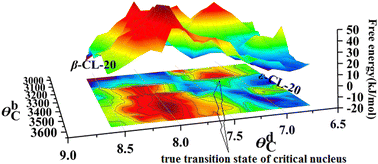Finite temperature string by K-means clustering sampling with order parameters as collective variables for molecular crystals: application to polymorphic transformation between β-CL-20 and ε-CL-20†
Abstract
Polymorphic transformation of molecular crystals is a fundamental phase transition process, and it is important practically in the chemical, material, biopharmaceutical, and energy storage industries. However, understanding of the transformation mechanism at the molecular level is poor due to the extreme simulating challenges in enhanced sampling and formulating order parameters (OPs) as the collective variables that can distinguish polymorphs with quite similar and complicated structures so as to describe the reaction coordinate. In this work, two kinds of OPs for CL-20 were constructed by the bond distances, bond orientations and relative orientations. A K-means clustering algorithm based on the Euclidean distance and sample weight was used to smooth the initial finite temperature string (FTS), and the minimum free energy path connecting β-CL-20 and ε-CL-20 was sketched by the string method in collective variables, and the free energy profile along the path and the nucleation kinetics were obtained by Markovian milestoning with Voronoi tessellations. In comparison with the average-based sampling, the K-means clustering algorithm provided an improved convergence rate of FTS. The simulation of transformation was independent of OP types but was affected greatly by finite-size effects. A surface-mediated local nucleation mechanism was confirmed and the configuration located at the shoulder of potential of mean force, rather than overall maximum, was confirmed to be the critical nucleus formed by the cooperative effect of the intermolecular interactions. This work provides an effective way to explore the polymorphic transformation of caged molecular crystals at the molecular level.



 Please wait while we load your content...
Please wait while we load your content...